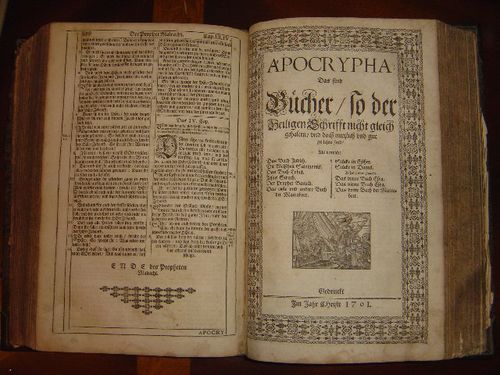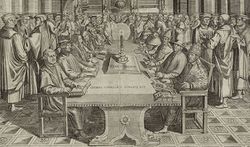Category:OT Apocrypha Studies--1500s
|
|
OT Apocrypha Studies : 2020s -- 2010s -- 2000s -- 1990s -- 1980s -- 1970s -- 1960s -- 1950s -- 1940s -- 1930s -- 1920s -- 1910s -- 1900s -- 1850s -- 1800s -- 1700s -- 1600s -- 1500s -- 1450s -- Home Timeline : 2020s -- 2010s -- 2000s -- 1990s -- 1980s -- 1970s -- 1960s -- 1950s -- 1940s -- 1930s -- 1920s -- 1910s -- 1900s -- 1850s -- 1800s -- 1700s -- 1600s -- 1500s -- 1450s -- Medieval -- Home
{{{title}}}
|
History of Research (1500s) -- Notes
The Reformation reopened the debate about the "apocryphal" books of Jerome. This time, however, at stake was not the Hebraica veritas but the Latina veritas. By denying the Latina veritas the Reformation intended to challenge the authority of the Roman Catholic Church to define the canon in the name of its tradition, while the Roman Catholic church at the Council of Trent (1546) pursued the opposite view: “If any one receive not, as sacred and canonical, the said books entire with all their parts, as they have been used to be read in the Catholic Church and as they are contained in the old Latin Vulgate . . . let him be anathema.”
In 1549, as a direct reaction against the pronouncement of the Council of Trent, English reformer Richard Taverner removed from the English Bible he had published in 1539 the "apocryphal" books of Jerome and published them as an autonomous book, titled The Volume of the Bokes called Apocripha (London: John Day and William Seres, 1549). The corpus of the OT Apocrypha was born. The Roman Catholic reply came in 1566 from Sixtus of Siena; he coined the term "deuterocanonici" in recognition of Jerome's doubts, but also to stress that the particular status of that body of literature did not diminish in any way their canonicity.
While reaching opposite conclusions, both Tavenier and Sixtus treated the OT Apocrypha/deuterocanici as a distinctive body of literature. Each of them could have relied on the traditional opposition between the "canonical" and "non-canonical" and get rid of any gray area in between, yet they surprisingly agreed in creating an hybrid. According to Tavernier the OT Apocrypha were not canonical, yet they had not be confused with the other "non-canonical" texts. According to Sixtus, the Deuterocanonici were canonical, yet they had not to be confused with the other canonical text.
The two works of Taverner and Sextus set the parameters of the international debate on the Deuterocanonici / OT Apocrypha for the centuries to come.
Pages in category "OT Apocrypha Studies--1500s"
The following 36 pages are in this category, out of 36 total.
1
- (++) Biblia Polyglotta (Complutensian Polyglot Bible / 1514-17 López de Zúñiga), edited volume (editio princeps)
- Testamenta duodecim patriarcharum filiorum Jacob (1520 Grosseteste), book
- Judita (Judith / 1521 Marulić), poetry (Croatian)
- Veteris et Novi Testamenti nova translatio (1527 Pagnini), book
- La saincte Bible en Francoys (The Holy Bible in French / 1530 Lefèvre), book
- Iudith (1532 Birck), play
- La Biblia (1532 Brucioli), book
- Biblia (Luther Bible / 1534 Luther), book
- La Bible (The Bible / 1535 Olivétan), book
- Matthew Bible (1537 Rogers), book
- Taverner's Bible (1539 Taverner), book
- Biblia; thet är, All then Helgha Scrifft, på Swensko (Gustav Vasa Bible / 1540-41 Andersson, Persson, Persson), book (Swedish)
- Sententiae morales Ben Syrae; Tobias hebraice (1542 Fagius), book
- Die fünff Bücher Mosis sampt dem Hohenlied Salomonis, Ruth, Claglied Hieremie, Prediger Salomonis, und Esther (1544 Fagius), book
- Biblia Graeca et Latina (Bible: Greek & Latin / 1550 Brylinger), book
- La saincte Bible (The Holy Bible / 1550 Leuze, Larben), book
- Judith mit Holophernes (1551 Sachs), play
- La gloriosa e trionfante vittoria donata dal grande Iddio al popolo hebreo per mezzo di Giuditta sua fidelissima serva (1564 Sacchetti), play
- Bibliotheca sancta (1566 Sisto da Siena), book
- Der Propheten Jonas, Nahum und Abacuc. Neben den sieben Buspsalmen Dauids, und dem Buch Tobie, ausgelegt (1567 Selnecker), book
- (++) Biblia sacra hebraice, chaldaice, grace et latine (Anterwerp Polyglot / 1568-1573 Arias Montano), edited volume
- Salomonis liber sapientiae (1568 Selnecker), book
- Sententiae Iesu Siracidae (1570 Camerarius), book
- Sapientia Jesu Siracidae (1571 Dolscius), book
- The Testaments of the Twelve Patriarchs, the Sonnes of Jacob (1574 Gilby), book
- Annotationes in librum Sapientiae Salomonis (1577 Jansenius), book
- Bibilija (Bible / 1584 Dalmatin, Trubar), book (Slovenian)
- Judit (Judith / 1584 Du Bartas), poetry
- Biblia (Bible / 1584 Guðbrandur Þorláksson), book (Icelandic)
- Christliche predigten uber das buch Tobie (Christian Preaching about the Book of Tobit / 1589 Colbe), book
- Szent Biblia (Holy Bible / 1590 Károli), book (Hungarian)
- Oloferne (1594 Alberti), play
- Imitation de la victoire de Judich (Imitation of the Victory of Judith / 1594 Coignard), poetry
- Sophia Seirach; sive, Ecclesiasticus (Book of Sirach / 1596 Drusius), book


